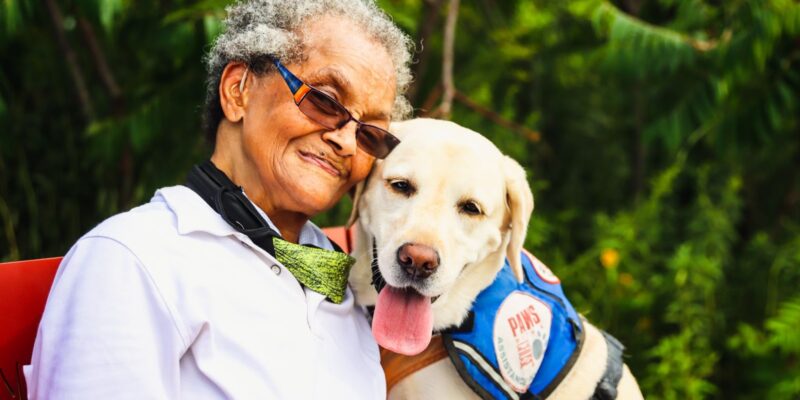As our beloved canine companions enter their senior years, they require more attention, love, and care. Aging in dogs, much like in humans, brings about various changes in their health, mobility, and behavior.
Understanding these changes and knowing how to care for aging dogs can significantly improve their quality of life.
This article provides comprehensive guidance on caring for senior dogs, discusses common health issues, and offers a checklist of tips excellent for maintaining their well-being as they age.
Understanding the Aging Process in Dogs
The aging process varies significantly among different dog breeds and sizes. Typically, larger breeds age quicker and are considered senior around 6-8 years, while smaller breeds might not show signs of aging until they are 10-12 years. Some of the common signs of aging in dogs include greying fur, decreased mobility, more pronounced sleeping patterns, and a noticeable slow down in activity.
Health Issues Common in Older Dogs
As dogs age, they are prone to several health issues. Some of the most common include:
- Arthritis: Joint problems are prevalent in older dogs, leading to pain and difficulty moving.
- Dental Problems: Years of wear and tear can lead to significant dental issues, including tooth loss and gum disease.
- Obesity: Reduced activity levels can lead to weight gain, exacerbating various health problems.
- Vision and Hearing Loss: Older dogs often experience a decline in their sight and hearing.
- Organ Failure: Kidneys, heart, and liver may start to function less efficiently as dogs age.
- Cognitive Dysfunction: Similar to Alzheimer’s in humans, older dogs can develop cognitive dysfunction, leading to confusion and disorientation.
Tips for Caring for Senior Dogs
1. Regular Veterinary Visits
As dogs age, regular check-ups become increasingly critical. Veterinarians can catch and manage health issues before they become severe. Senior dogs should have a check-up at least once a year, if not more frequently, to monitor their health status and make any necessary adjustments to their care.
2. Appropriate Diet and Nutrition
Senior dogs have different nutritional needs. They may require food that’s easier to digest, has fewer calories, or is formulated to combat specific health issues like kidney problems or joint pain. Always consult with your vet to determine the best diet for your aging dog.
3. Maintaining an Appropriate Weight
Obesity can significantly impact the health and mobility of your senior dog. Keep them at a healthy weight through a balanced diet and regular, gentle exercise suited to their ability.
4. Adapting Exercise Routines
While exercise remains important for senior dogs, their routine may need to change. Shorter, more frequent walks can replace longer excursions, and soft, low-impact activities can replace high-energy games. Keep them mentally stimulated with gentle, interactive play.
5. Comfortable Living Environment
As your dog ages, their sleeping arrangement may need an update. Orthopedic pet beds can provide better support for aching joints. Ensure their living space is easily accessible, preferably avoiding stairs or providing ramps if necessary.
6. Managing Pain and Discomfort
Work with your veterinarian to manage any pain or discomfort your dog may experience due to arthritis or other conditions. There are various medications and supplements that can help make your dog more comfortable.
7. Monitoring and Adapting to Sensory Changes
If your dog starts to show signs of vision or hearing loss, secure your home to prevent accidents. Maintain a consistent layout and guide them through changes in their environment. Use more verbal commands if their vision is failing, or rely on hand signals for dogs losing their hearing.
8. Cognitive Health
Keep your senior dog’s mind sharp with interactive toys and games. Training shouldn’t stop when your dog becomes a senior; teaching them new, simple tricks can provide mental stimulation and help keep cognitive dysfunction at bay.
Emotional and Social Needs
Senior dogs may require more affection and attention as they age. Continue to provide them with a loving environment, keeping them integrated into your daily life. Social interactions with people and other pets can help maintain their mental health and stave off loneliness.
End-of-Life Care
As difficult as it is to consider, part of caring for a senior dog is knowing when to let go. Work with your veterinarian to understand the quality of life your dog has and make compassionate decisions regarding their care, including palliative care and, if necessary, euthanasia.
Conclusion
Caring for a senior dog requires patience, understanding, and a commitment to adapting their care as they age. While it can be challenging to watch our beloved pets grow older, with the right care, we can ensure their golden years are comfortable and full of love.
From modifying their diet and exercise routine to making changes in their environment and keeping a close eye on their health, every small step we take can significantly enhance the quality of life of our aging canine friends.
As they’ve given us unconditional love and loyalty throughout their lives, it’s our privilege to provide them with the care and comfort they deserve in their senior years.







Comments